2 May
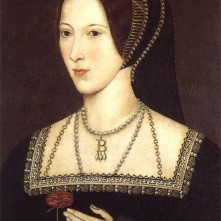
Anne Boleyn
1536 - Sir Henry Norris, Henry VIII’s Groom of the Stool and great friend, was taken to the Tower of London.
1536 - Arrest of Anne Boleyn. She was informed that she was being accused of committing adultery with three different men, and that Smeaton and Norris had confessed. Anne was taken to her apartments until the tide of the Thames turned and then, at two o’clock in the afternoon, she was escorted by barge to the Tower of London.
1542 – Burial of Henry Clifford, 1st Earl of Cumberland and close friend of Henry VIII, at Skipton Church in Yorkshire. Cumberland served the King as Warden of the West Marches, and was rewarded for his service and loyalty during the Pilgrimage of Grace by being elected as a Knight of the Order of the Garter.
1550 – Burning of Joan Bocher, an Anabaptist, at Smithfield. Bocher believed that Christ's flesh was “not incarnate of the Virgin Mary” and was convicted of heresy and condemned to death.
1551 – Birth of William Camden, historian, headmaster and herald, at the Old Bailey, London. Camden is known for his “Britannia”, the first chorographical survey of Great Britain and Ireland, and his Annales Rerum Gestarum Angliae et Hiberniae Regnate Elizabetha, his history of Elizabeth I's reign, but he also wrote a Greek grammar and “Remaines of a Greater Worke, Concerning Britaine”, which was a collection of historical essays.
1568 – Mary, Queen of Scots escaped from Lochleven Castle. As a May Day masque took place at the castle, Mary was smuggled out and taken to a waiting boat.
1587 – Burial of Sir Thomas Bromley, Lord Chancellor, in Westminster Abbey.
1620 – Burial of Edward More, poet and grandson of Sir Thomas More. He was buried at Barnborough, Yorkshire.
3 May
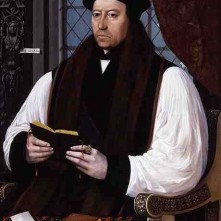
Thomas Cranmer
1415 – Birth of Cecily Neville, Duchess of York, daughter of Ralph Neville, 1st Earl of Westmorland, and Joan Beaufort. Cecily was the wife of Richard, 3rd Duke of York, and the mother of twelve children, including Richard III, George, Duke of Clarence, and Edward IV.
1446 – Birth of Margaret, Duchess of Burgundy, also known as Margaret of York, third daughter of Cecily Neville (see above) and Richard, 3rd Duke of York. She was married to Charles the Bold, who became Duke of Burgundy, and she was godmother to Emperor Charles V.
1524 – Death of Richard Grey, 3rd Earl of Kent, son of George Grey, 2nd Earl of Kent, and Anne Bourchier (née Woodville).
1536 - A very shocked Archbishop Thomas Cranmer wrote to King Henry VIII regarding his patron Queen Anne Boleyn’s arrest. In his letter, he wrote “I am clean amazed, for I had never better opinion of woman”, but tempered this with “but I think your Highness would not have gone so far if she had not been culpable”, so as not to offend the King.
1568 – Death of Sir Edward Rogers, courtier, member of Parliament and Comptroller and Vice-Chamberlain of the Household to Elizabeth I. Rogers served Henry VIII as Esquire of the Body, Sewer of the Privy Chamber and Carver; Edward VI as a Gentleman of the Privy Chamber and Elizabeth I as Vice-Chamberlain, Captain of the Guard, Privy Councillor and Comptroller. In Mary I's reign, he was imprisoned for a time after being implicated in Wyatt's Rebellion.
1580 – Death of Thomas Tusser, poet, farmer and writer on agriculture, at the age of sixty-five. He was buried at Manningtree in Essex. Tusser is known for his “A Hundreth Good Pointes of Husbandrie”, a poem recording the country year, and “Five Hundreth Points of Good Husbandry United to as many of Good Huswiferie”, an instructional poem on farming.
1610 – Death of Sir William Skipwith, member of Parliament, Sheriff of Leicestershire and poet. In his “Worthies of England”, author and historian Thomas Fuller described Skipwith as “dexterous at the making fit and acute epigrams, poesies, mottoes and devices”. He was buried at Prestwold Church in Leicestershire.
4 May
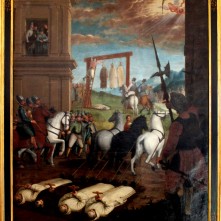
Carthusian Martyrs
1471 – Death of Edward of Westminster, Prince of Wales and only son of Henry VI, at the Battle of Tewkesbury.
1513 – Execution of Edmund de la Pole, 8th Earl of Suffolk and claimant to the English throne. He was executed after his brother, Richard de la Pole, claimed the throne of England in his own right and was recognised as king by Louis XII of France. Edmund and Richard were sons of John de la Pole, 2nd Duke of Suffolk, and his wife, Elizabeth Plantagenet, sister of Edward IV.
1535 – Executions of three Carthusian monks and a Bridgettine monk at Tyburn for rejecting the royal supremacy. Click here to read more about them.
1536 – Arrests of Sir Francis Weston and Sir William Brereton during the fall of Anne Boleyn. They were both taken to the Tower of London. Click here to read more.
1608 – Funeral of Elizabeth Talbot (Bess of Hardwick), Countess of Shrewsbury, in All Hallows, Derby. At the time of her death, she was one of the richest people in England.
5 May
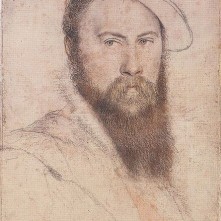
Thomas Wyatt
1535 – Death of Charles Booth, Bishop of Hereford. He was buried in Hereford Cathedral.
1536 – By the 5th May, the final arrests (Sir Thomas Wyatt and Richard Page) had been made in the fall of Anne Boleyn.
1542 – Birth of Thomas Cecil, 1st Earl of Exeter, courtier and soldier, and the eldest son of William Cecil, 1st Baron Burghley, by his first wife Mary Cheke.
1542 - Agnes Tilney, Dowager Duchess of Norfolk, was pardoned after spending nearly five months imprisoned in the Tower of London. Her home and valuables had been seized but she had kept her head, unlike her step-granddaughter, Catherine Howard.
1543 – Execution of George Bucker (aka Adam Damplip), religious radical. He was hanged, drawn and quartered in Calais for treason.
1586 – Death of Sir Henry Sidney, courtier and Lord Deputy of Ireland. His body was buried in the Sidney Chapel at Penshurst and his heart in Ludlow, where he lived as President of the Council in the Marches of Wales.
1623 – Death of Philip Rosseter, lutenist, composer and theatre manager.
1625 – Burial of James I (VI of Scotland) in the Henry VII Chapel of Westminster Abbey. He had been King of England for twenty-two years, and was known for uniting the crowns of England and Scotland.
6 May
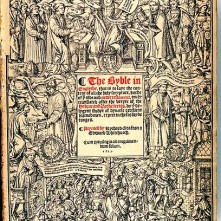
The Great Bible
1471 – Execution of Edmund Beaufort, styled 3rd Duke of Somerset, in Tewkesbury market place. He had headed Margaret of Anjou's troops at the Battle of Tewkesbury, and after their defeat had tried to take sanctuary at Tewkesbury Abbey. Edward IV broke into the abbey and captured him.
1502 – Execution of Sir James Tyrell, former royal councillor, for treason after he had spent time with Edmund de la Pole. He is known for a confession which he was alleged to have made after his arrest, confessing to murdering the Princes in the Tower.
1527 – The Sack of Rome. Rome was attacked and looted by mutinous imperial troops. Pope Clement VII managed to escape, but the majority of the Swiss Guard were killed.
1536 - It is said that Anne Boleyn wrote a letter to her husband, King Henry VIII, from the Tower of London. It was headed with the words “To the King from the Lady in the Tower”, alleged to have been written by Thomas Cromwell. It is not known for sure whether Anne definitely wrote it.
1540 – Death of Juan Luis Vives, scholar, at Bruges. Tudor history lovers know him for being a friend and spiritual adviser to Catherine of Aragon and a tutor to Princess Mary. He wrote a treatise, “Education of a Christian Woman”, with Catherine's encouragement, and also wrote Satellitium animi, or “Escort of the Soul”, a plan of study for Mary.
1541 – Henry VIII issued an injunction ordering "the Byble of the largest and greatest volume, to be had in every churche". The Bible referred to was “The Great Bible” or “Coverdale Bible”, the first authorised Bible in English. It had been prepared by Miles Coverdale and was based on the work of William Tyndale.
1563 – Burial of Henry Stafford, 10th Baron Stafford, in Worthen Church near Caus Castle in Shropshire.
7 May

Bishop John Fisher
1535 - John Fisher, former Bishop of Rochester, was visited by Thomas Cromwell, Master Secretary, and member of the King's Council. Cromwell read out the “Act of Supremacy” and Fisher refused to acknowledge the King as the supreme head of the Church, saying “The King owre Soveraign Lord is not supreme hedd yn erthe of the Cherche of Englande.” It is alleged that Richard Rich tricked him into saying those words, telling him that the King wished to know his real opinion in secret, but whatever the truth of the matter, Fisher was found guilty of treason and executed on 22nd July 1535.
1536 – Queen Anne Boleyn’s chaplain, William Latymer, was searched by the Mayor and jurates of Sandwich on his arrival back in England. He was returning from a business visit to Flanders, a visit he had undertaken on behalf of the Queen. Latymer had often brought Anne religious books back from the Continent, so it was lucky for him that he did not have anything which could have been deemed as heretical in his luggage. Records were made of the books that he was carrying and of those which he was having sent directly to London, but he was allowed to carry on with his journey.
1540 – Death of Sir William Weston, Prior of the Hospital of St John of Jerusalem in England. He died at the priory on the day that the order to dissolve it was passed through the Commons. He was the uncle of Sir Francis Weston, a man executed in 1536 in the coup against Anne Boleyn.
1547 – Death of John Longland, Bishop of Lincoln, at Wooburn. He had requested that his body be buried at Eton College and his heart in the cathedral church at Lincoln.
1560 – English troops charged the wall of Leith at the siege of Leith. They were unsuccessful and suffered heavy losses.
1567 – Divorce of James Hepburn, 4th Earl of Bothwell, and Jean Gordon. The grounds for divorce were her alleged adultery with her servant, but Bothwell married Mary, Queen of Scots, just eight days later.
1592 – Death of Sir Christopher Wray, judge, Chief Justice of the King's Bench and Speaker of the House of Commons. He was buried at St Michael's Church, Glentworth, Lincolnshire.
1594 – Death of Edmund Scambler, Bishop of Peterborough and Norwich, at Norwich. He was buried in the cathedral, but his tomb was destroyed in the Civil War.
1603 – James VI/I arrived in London after travelling from Edinburgh to claim the English throne. His predecessor, Elizabeth I, had died on 24th March.
8 May
1508 – Birth of Charles Wriothesley, herald and chronicler, in London. His chronicle is one of the major primary sources for Henry VIII's reign. Charles came from a family of heralds; he was the younger son of Sir Thomas Wriothesley, Garter King of Arms, grandson of John Writhe, Garther King of Arms, and nephew of William Wriothesley, York Herald. Charles' offices included Rouge Croix Pursuivant and Windsor Herald of Arms in Ordinary, but he did not go as far as his father and grandfather.
1538 – Death of Edward Fox, Bishop of Hereford and diplomat. He was active in trying to secure the annulment of Henry VIII's marriage to Catherine of Aragon, and produced several books and polemics on Henry's Great Matter, including Henricus octavus.
1539 – The troops mustered between Whitechapel and Mile End marched through the City and Westminster to St James's, where Henry VIII reviewed them. This was in response to the war panic caused by Francis I and Charles V signing the Peace of Toledo.
1546 – Death of Thomas Knollys, President of Magdalen College, University of Oxford, from 1528 to 1536. In 1536, Knollys became Vicar of South Kirlby and died there in 1546. He was buried at Wakefield.
1559 – The “Act of Uniformity” was signed by Elizabeth I, and the “Act of Supremacy” was given royal assent. The monarch was Head of the Church again, and still is today.

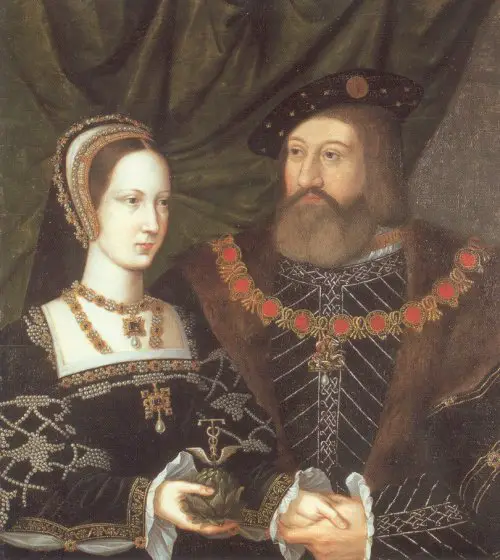
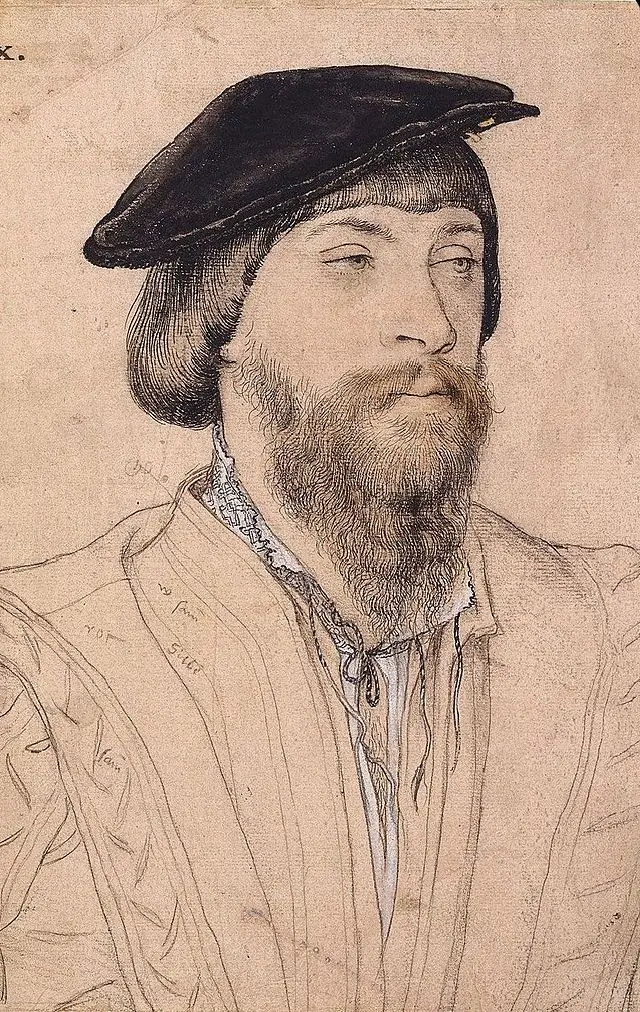
Leave a Reply